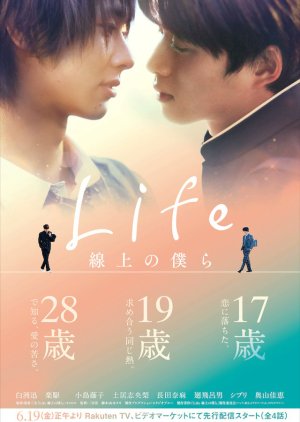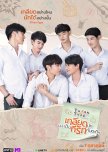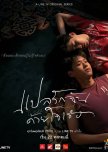
It's more on the realistic side of homosexual relationship. Both great in giving tension and bringing the perfect atmosphere!!
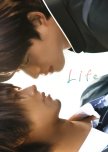
Life: Love on the Line (Director's Cut) is the movie version of the drama, Life Senjou no Bokura , with added scenes that bring closure to the story.

A bl and some scene have similarities.
Kouta and Akira have some similarities in personalities and looks
Kouta and Akira have some similarities in personalities and looks

One day after school, the serious Ito and the child-like Nishi meet by chance, as each endeavors to remain walking on the sidewalk`s white line. As time goes by, Ito recognizes he is drawn to Nishi in a way that is new to him. Nishi, for his part, is frustrated that they only get to meet on the sidewalk. Ito decides to act upon his feelings and kisses a surprised Nishi, who agrees they need to walk side by side for a change. The sparks between them are undeniable as their relationship blossoms in high school, survives the college years, and matures into adulthood. A deeply moving work that bears witness to loving partners, whose unchanging feelings must

Both of these series show young love blooming within the years of high school. While in Life Senjou no Bokura the story is told over a decades worth of time, HIStory3: Make our days Count is told within the short time of high school and some of college. The lead actors from HIStory3 make an appearance in the final episode of Life Senjou no Bokura and it definitely worth watching to understand how this cameo is a potential alternative ending to HIStory3.

Both are BL, Japanese, fairly short series, and really great romances. Love on the line was way more raw and emotional whereas His was more soft and cute, but I really enjoyed them both and I feel like if you liked one you would definitely like the other. The beginning of Love on the line has the sort of coming of age and first love vibe that His has throughout.
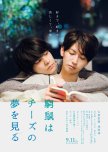
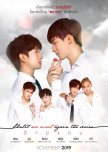
Just going through so much with each other to just love and it’s really good
A bit sad but it’s kind of similar to the ending of love life on the line and until we meet again.
The actors have very good chemistry with each other also it’s a mix with happy and sad moments in the drama.
All I know is that it’s a very good recommendation and basically the end of life love on the line is like the one telling me to get in someway.
A bit sad but it’s kind of similar to the ending of love life on the line and until we meet again.
The actors have very good chemistry with each other also it’s a mix with happy and sad moments in the drama.
All I know is that it’s a very good recommendation and basically the end of life love on the line is like the one telling me to get in someway.

One day after school, the serious Ito and the child-like Nishi meet by chance, as each endeavors to remain walking on the sidewalk`s white line. As time goes by, Ito recognizes he is drawn to Nishi in a way that is new to him. Nishi, for his part, is frustrated that they only get to meet on the sidewalk. Ito decides to act upon his feelings and kisses a surprised Nishi, who agrees they need to walk side by side for a change. The sparks between them are undeniable as their relationship blossoms in high school, survives the college years, and matures into adulthood. A deeply moving work that bears witness to loving partners, whose unchanging feelings must co-exist within a world of changing realities.

When Kosuke was 14 years old, his mother died. As a young gay person, he spent his adolescence in a rural village and suppressed his feelings. Now, Kosuke is all grown up and he works as a fashion magazine editor in Tokyo. He meets Ryuta, who works as a personal trainer. Ryuta's mother raised him alone and he is close to his mother. Kosuke and Ryuta become attracted to each other and they sometimes spend time with Ryuta's mother. Kosuke is happy to share time with Ryuta and his mother, which makes him remember his late mother. Kosuke and Ryuta make an appointment to go for a drive together, but, on that day, Ryuta does not show up.

One day after school, the serious Ito and the child-like Nishi meet by chance, as each endeavors to remain walking on the sidewalk`s white line. As time goes by, Ito recognizes he is drawn to Nishi in a way that is new to him. Nishi, for his part, is frustrated that they only get to meet on the sidewalk. Ito decides to act upon his feelings and kisses a surprised Nishi, who agrees they need to walk side by side for a change. The sparks between them are undeniable as their relationship blossoms in high school, survives the college years, and matures into adulthood. A deeply moving work that bears witness to loving partners, whose unchanging feelings must co-exist within a world of changing realities.


A change in the stakeout team throws Onoe, reporter for a weekly magazine, together with his contemporary, Kaburagi, a photographer. Onoe secretly considers Kaburagi his rival, and Kaburagi's haphazard way of doing things goes against Onoe's strong sense of ethics. There's nothing but conflict between them. But, in joint pursuit of a scandal, the two of them begin to care about each other...? ~~ Adapted from the manga "Ameiro Paradox" by Natsume Isaku

There’s a very specific feel to Life: Senjou no Bokura, and it’s a very neutrally told story - by that I’m referring to a greyer tone. There’s very few shows I’d compare it with; but if you like the feel of Jack O’ Frost, you can find that again in Life: Senjou no Bokura and vice versa.
The plots are totally different and I’d also say don’t be quick to judge either by its synopsis - both are shows I’d dismiss looking at the synopsis but they carry themselves well if you give them a chance.
The plots are totally different and I’d also say don’t be quick to judge either by its synopsis - both are shows I’d dismiss looking at the synopsis but they carry themselves well if you give them a chance.

A man killed himself. Due to his death, three of his former classmates from art school, reunite for the first time in a long while. These three people have connections to the man in different ways, including his ex-girlfriend, the manager of a rugby club where the man played, and his ex-boyfriend. While struggling with their own lives, these three people begin to meet and have meals together.
Oda Chiharu worked as a designer for a company she has long coveted to work for, but, due to bullying by her boss, she quit her job. She finds pleasure in cooking and serving her food to other people. When she is alone, she often eats food from the convenience store. Nakamura Seiko works in the PR department for a cosmetics company. Being influence by her family, she has grown up with the idea that marriage is mandatory and not optional. She now has a strong desire to marry, but her fiancé, who works in the same department, suddenly breaks off their engagement.
Amagai Eiji worked as a designer for an advertising agency, but he was suddenly transferred to the sales department. He doesn’t know what he wants to do anymore. He is a gay man, but he hasn't revealed his sexual orientation to his parents.
Oda Chiharu worked as a designer for a company she has long coveted to work for, but, due to bullying by her boss, she quit her job. She finds pleasure in cooking and serving her food to other people. When she is alone, she often eats food from the convenience store. Nakamura Seiko works in the PR department for a cosmetics company. Being influence by her family, she has grown up with the idea that marriage is mandatory and not optional. She now has a strong desire to marry, but her fiancé, who works in the same department, suddenly breaks off their engagement.
Amagai Eiji worked as a designer for an advertising agency, but he was suddenly transferred to the sales department. He doesn’t know what he wants to do anymore. He is a gay man, but he hasn't revealed his sexual orientation to his parents.

